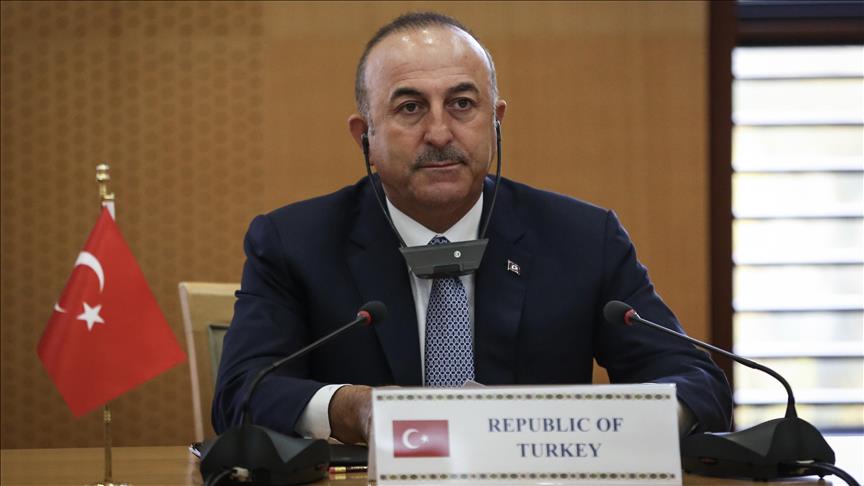Turkey eyes promoting ties with Turkmenistan: FM
Trade relations, bilateral investments, energy, transportation top Turkish FM’s agenda in Ashgabat
 Foreign Minister of Turkey Mevlut Cavusoglu and Foreign Minsiter of Turkmenistan Rashid Meredov (not seen) hold a meeting in Ashgabat, Turkmenistan on November 9, 2018. ( Cem Özdel - Anadolu Agency )
Foreign Minister of Turkey Mevlut Cavusoglu and Foreign Minsiter of Turkmenistan Rashid Meredov (not seen) hold a meeting in Ashgabat, Turkmenistan on November 9, 2018. ( Cem Özdel - Anadolu Agency )
By Ecenur Colak
ASHGABAT
Turkey’s foreign minister on Friday expressed willingness to promote the bilateral relations with Turkmenistan.
Speaking after a meeting with his Turkmen counterpart Rashid Meredov in Ashgabat, Mevlut Cavusoglu said: “We know that we need to accelerate our relations. We will from now on meet [with Turkmen officials] more regularly and more often.
“During today’s talks, we have evaluated particularly our trade relations and bilateral investments. On the other hand, we have discussed our very important topics such as energy and transportation.”
Cavusoglu was earlier received by Turkmen President Gurbanguly Berdimuhamedov in the capital city.
Stating that scores of Turkish firms invested in Turkmenistan and carried out projects, Cavusoglu thanked Turkmen officials for supporting to Turkish companies.
Approximately 600 Turkish companies are registered in Turkmenistan, according to Turkish Foreign Ministry.
“Turkmenistan has become the leading country in Central Asia for Turkish contracting companies,” the ministry says in the website.
Following the meeting, Cavusoglu and Meredov inked a document on the cooperation program between the two ministries for 2019-2020.
“We will continue working together to implement all the elements of the roadmap [of the program],” Cavusoglu said.
Turkey will also give support to the regional conference to be held in Turkmenistan on transportation and will attend it, he added.
Cavusoglu also said he conveyed messages of President Recep Tayyip Erdogan during his visit and mentioned the possibility of holding a trilateral summit between Turkey, Turkmenistan, and Azerbaijan.
Historic Silk Road
On the revival of historic Silk Road, the ancient network of trade routes that connected the East and West, Cavusoglu stressed that Turkey, Turkmenistan, and Azerbaijan have very important responsibilities.
“We are the most important three actor countries in this route,” he said.
Turkish minister said they discussed railway and land transportation projects, energy security and ways of laying subsea pipelines in the Caspian Sea to revive the historic route.
They also addressed the ways to link Trans Anatolian Natural Gas Pipeline (TANAP) in order to carry the Turkmen gas into European and the world markets for the revival of the route.
The 1,850-kilometer-long TANAP was officially inaugurated on May 29 during a ceremony held in Baku with the participation of Azerbaijan's president.
International organizations need reform
In a separate event on Turkish Foreign Policy – Humanitarian Diplomacy in the city, Cavusoglu criticized international organizations, including the UN and the European Council, saying that they fail in finding solutions to global problems.
“We need to reform all the international system,” he said.
In regards to Syria crisis, he stated that Turkey has been working hard to find a political solution in Syria by applying a humanitarian foreign policy.
“By setting up a constitutional commission, we want to resolutely move forward to a political solution in Syria.”
Syria has only just begun to emerge from a devastating conflict that began in 2011 when the Assad regime cracked down on demonstrators with unexpected ferocity.
The foreign minister also welcomed Turkmenistan’s solidarity with Turkey in fight against the Fetullah Terrorist Organization (FETO), the group behind the 2016 defeated coup attempt.
“Turkmenistan has been one of the first countries which took the bravest step before and after the coup attempt,” he said.
“We surely attach great importance to Turkmenistan’s security and stability. We will increase our cooperation in this field as well.”
According to the Turkish government, the Fetullah Terrorist Organization (FETO) and its U.S.-based leader Fetullah Gulen orchestrated the defeated coup of July 15, 2016, which left 251 people martyred and nearly 2,200 injured.
Ankara also accuses FETO of being behind a long-running campaign to overthrow the state through the infiltration of Turkish institutions, particularly the military, police, and judiciary.



